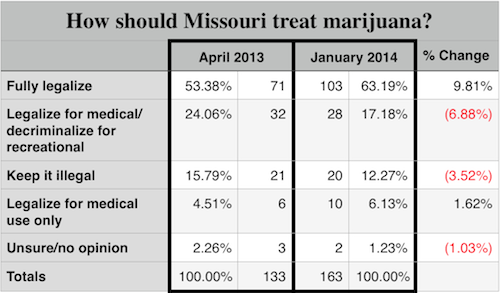Missouri’s August Primary
Two days ago many voters in the region went to the polls to vote on local measures, such as bond issues. Those of us in the City of St. Louis didn’t have an election, our next time voting will be the Missouri primary on Tuesday August 5, 2014. However, voters in the 13th ward will vote at a special election on April 29th. Fred Wessels resigned as alderman on December 31st to become the head of the Community Development Administration (CDA):
The CDA, among other things, administers federal funds for housing, community and economic development programs. It’s also responsible for administering the city’s share of federal community development block grants.
Wessels will replace Jill Claybour, who is retiring. (Beacon)
The 13th ward candidates are Beth Murphy (D) and Conan Predergast (R), see official list here. Phyllis Young of the 7th ward is now the most senior alderman, her and Wessels were both sworn into office in April 1985.

IMPORTANT PRIMARY DATES:
- Absentee balloting begins: Tuesday June 24, 2014
- Last Day to Register to Vote: Wednesday July 9, 2014
- Primary Election Day: Tuesday August 5, 2014
In the city the primary will include three county-level offices: Collector of Revenue, License Collector, and Recorder of Deeds. Let’s take a look at the candidates seeking the nomination of their party:
Collector of Revenue
- Democratic
- Gregory F.X. Daly (Incumbent)
- John P. Parhomski
- Republican
- Dylan M. Farrell
- Green
- None
License Collector
- Democratic
- Mavis “Tesssa” Thompson (Incumbent)
- Jeffrey L. Boyd
- Francis Horton
- Republican
- None
- Green
- Don DeVivo
Recorder of Deeds
- Democratic
- Jimmie Matthews
- Sharon Quigley Carpenter (Incumbent)
- Edward McFowland
- Republican
- Erik Shequist
- Green
- None
What do we know from this list? All three incumbents are Democrats, no surprise. What’s surprising and refreshing is all three are being challenged in the primary. We also know the two Republicans, and the one Green, will represent their respective parties in the November general election.
The most interesting of the races is the Democratic primary for License Collector. Thompson was appointed by Gov. Nixon last year to replace Michael McMillan, who became President of the Urban League of St. Louis. Alderman Jeffrey Boyd ran unsuccessfully for Treasurer in 2012, coming in 3rd in the 4-way Democratic primary, just after Fred Wessels.
— Steve Patterson


